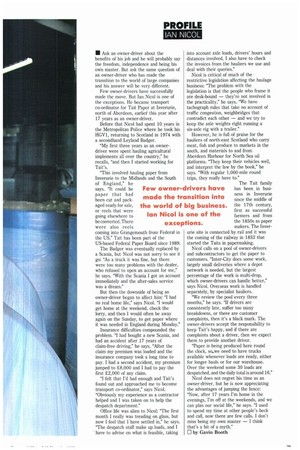PROFILE
Page 41

If you've noticed an error in this article please click here to report it so we can fix it.
IAN !COL
• Ask an owner-driver about the benefits of his job and he will probably say the freedom, independence and being his own master. But ask the same question of an owner-driver who has made the transition to the world of large companies and his answer will be very different.
Few owner-drivers have successfully made the move. But Ian Nicol is one of the exceptions. He became transport co-ordinator for Tait Paper at Inverurie, north of Aberdeen, earlier' this year after 17 years as an owner-driver, Before that Nicol had spent 10 years in the Metropolitan Police where he took his HGV1, returning to Scotland in 1974 with a secondhand Leyland Badger.
"My first three years as an ownerdriver were spent hauling agricultural implements all over the country," he recalls, "and then I started working for Tait's.
"This involved hauling paper from Inverurie to the Midlands and the South of England," he says. "It could be paper that had been cut and packaged ready for sale, or reels that were going elsewhere to be converted. There were also reels coming into Grangemouth from Federal in the US." Tait has been part of the US-based Federal Paper Board since 1989.
The Badger was eventually replaced by a Scania, but Nicol was not sorry to see it go: "As a truck it was fine, but there were too many problems with the dealer, who refused to open an account for me," he says. "With the Scania I got an account immediately and the after-sales service was a dream."
But then the downside of being an owner-driver began to affect him: "I had no real home life," says Nicol. "I would get home at the weekend, check the lorry, and then I would often be away again on the Sunday, to get paper where it was needed in England during Monday."
Insurance difficulties compounded the problem. "I had bought a new Scania, and had an accident after 17 years of claim-free driving," he says. "After the claim my premium was loaded and the insurance company took a long time to pay. I had a second accident, my premium jumped to £8,000 and I had to pay the first £2,000 of any claim.
"1 felt that I'd had enough and Tait's found out and approached me to become transport co-ordinator," says Nicol. "Obviously my experience as a contractor helped and I was taken on to help the despatch department."
Office life was alien to Nicol: "The first month I really was treading on glass, but now I feel that I have settled in," he says. "The despatch staff make up loads, and I have to advise on what is feasible, taking into account axle loads, drivers' hours and distances involved. I also have to check the invoices from the hauliers we use and deal with their queries."
Nicol is critical of much of the restrictive legislation affecting the haulage business: "The problem with the legislation is that the people who frame it are desk-bound — they're not involved in the practicality," he says. "We have tachograph rules that take no account of traffic congestion, weighbridges that contradict each other — and we try to keep the axle weights right running a six-axle rig with a trailer."
However, he is full of praise for the hauliers of north-east Scotland who carry meat, fish and produce to markets in the south, and materials to and from Aberdeen Harbour for North Sea oil platforms. "They keep their vehicles well, and interpret the law by the book," he says. "With regular 1,000-mile round trips, they really have to."
The Tait family has been in business in Inverurie since the middle of the 17th century, first as successful farmers and from the 1850s as paper makers. The Inverurie site is connected by rail and it was the coming of the railway in 1852 that started the Taits in papermaldng.
Nicol calls on a pool of owner-drivers and subcontractors to get the paper to customers. "Inter-City does some work, largely small deliveries where a depot network is needed, but the largest percentage of the work is multi-drop, which owner-drivers can handle better," says Nicol. Overseas work is handled separately, by specialist hauliers.
"We review the pool every three months," he says. "If drivers are consistently late, suffer too many breakdowns, or there are customer complaints, then it's a black mark. The owner-drivers accept the responsibility to keep Tait's happy, and if there are complaints about a driver, then we expect them to provide another driver.
"Paper is being produced here round the clock, sa_we need to have trucks available whenever loads are ready, either for longer hauls or for our warehouse. Over the weekend some 30 loads are despatched, and the daily total is around 16."
Nicol does not regret his time as an owner-driver, but he is now appreciating the advantages of jumping the fence: "Now, after 17 years I'm home in the evenings, I'm off at the weekends, and we can plan our social life," he says. "I used to spend my time at other people's beck and call, now there are few calls. I don't miss being my own master — I think that's a bit of a myth."
[]by Gavin Booth




























































































































